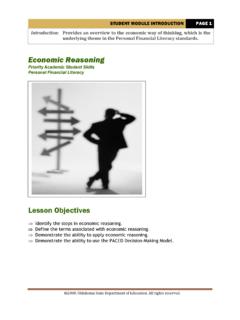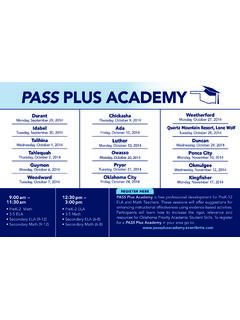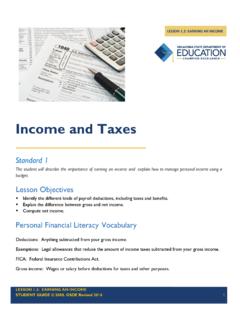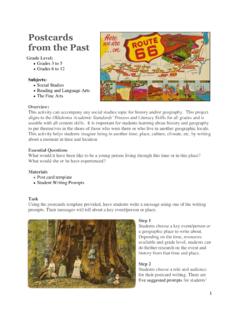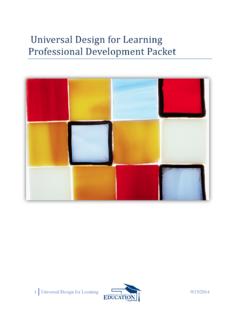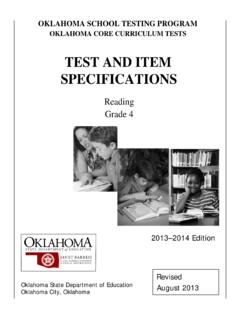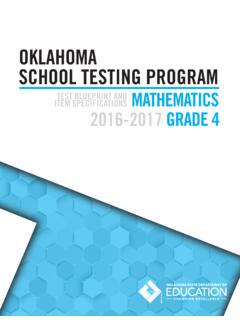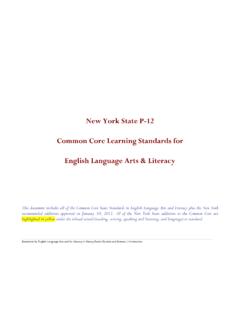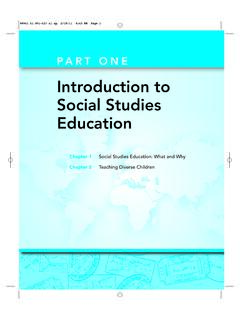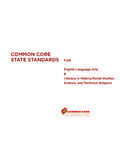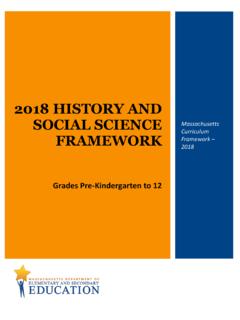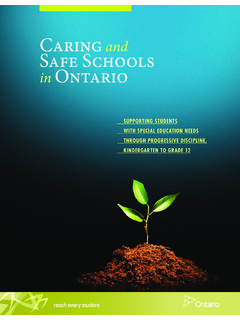Transcription of OKLAHOMA SOCIAL ACADEMIC STUDIES STANDARDS
1 OKLAHOMAACADEMICSTANDARDSSOCIALSTUDIES OKLAHOMA ACADEMIC STANDARDS for SOCIAL STUDIES introduction Page 2 Table of Contents introduction 3 8th Grade 32 SOCIAL STUDIES Practices 6 Economics 41 Pre-Kindergarten 8 OKLAHOMA History 45 Kindergarten 9 Psychology 51 1st Grade 11 United States Government 54 2nd Grade 13 United States History 58 3rd Grade 15 World Geography 67 4th Grade 18 World History 70 5th Grade 21 Sociology 75 6th Grade 26 Appendix A: SOCIAL STUDIES Practices Vertical Progression 78 7th Grade 29 OKLAHOMA ACADEMIC STANDARDS for SOCIAL STUDIES introduction Page 3 introduction The OKLAHOMA ACADEMIC STANDARDS for SOCIAL STUDIES is the result of the contributions of hundreds of SOCIAL STUDIES educators, representatives of higher education, tribal representatives, and community members. This document reflects a balanced synthesis of the work of all members of the OKLAHOMA ACADEMIC STANDARDS for SOCIAL STUDIES Writing and Draft Committees.
2 The STANDARDS specify what students should know and be able to do as learners of SOCIAL STUDIES at the end of each grade level or SOCIAL STUDIES course. The order of the STANDARDS at any grade level is not meant to imply a sequence of topics and should be considered flexible for the organization of any course. The OKLAHOMA ACADEMIC STANDARDS for SOCIAL STUDIES were informed by the National Council of the SOCIAL STUDIES (NCSS) Skills Framework , the Center for Civic Education Civics STANDARDS , the National Council for Geographic Education (NCGE) Geography for Life STANDARDS , the Council for Economic Education Voluntary National Content STANDARDS in Economics, the National Council for History Education (NCHE) Habits of Mind, the National Center for History in the Schools STANDARDS for Historical Thinking, the OKLAHOMA ACADEMIC STANDARDS for English Language Arts and SOCIAL STUDIES , and other states STANDARDS documents.
3 STANDARDS Overview Having a literate citizenry rests on a commitment to democratic values and the practice of them. It requires the ability to use knowledge about one s community, nation and world, apply inquiry processes, and employ skills of data collection and analysis, collaboration, decision-making; and problem-solving. Young people who are knowledgeable, skillful, and committed to democracy are necessary to sustaining and improving the democratic way of life. This will also enable our students to become participating members of a global community. A well-rounded, vigorous SOCIAL STUDIES education encourages and enables each student to acquire a core of basic knowledge, an arsenal of useful skills, and a way of thinking drawn from many ACADEMIC disciplines. Thus equipped, students are prepared to become informed, contributing, and participating citizens in this democratic republic the United States of America.
4 The STANDARDS are comprised of two primary components, content STANDARDS and SOCIAL STUDIES practices. The content STANDARDS designate specific learning targets at each grade level or course. These content STANDARDS are derived from the major disciplines of the SOCIAL sciences: history, geography, civics and economics. The SOCIAL STUDIES practices define basic skills and disciplinary tools to prepare students for college, career, and civic life. These practices are meant to be integrated with the instruction of content STANDARDS . OKLAHOMA ACADEMIC STANDARDS for SOCIAL STUDIES introduction Page 4 SOCIAL STUDIES Content Strands Overview SOCIAL STUDIES is a systematic and coordinated discipline designed to promote civic competence by drawing upon four content strands: history, geography, civics, and economics. These strands draw from all fields of study related to the SOCIAL sciences to provide a framework used in the development of the content STANDARDS for SOCIAL STUDIES .
5 They are to be threaded through an integrated program, from grades pre-K through 12, as appropriate at each level. While at some grades and for some courses, specific strands will be more dominant than others, all strands are represented and interrelated in the STANDARDS for each grade and course. Strand 1: History History focuses on the written record of human experience revealing how individuals and societies developed institutions, philosophies, ideals, and cultural values, and resolved their problems. A balanced study of history helps students understand the how and why of the challenges and successes of past societies. By studying the choices and decisions of the past, students can confront today s problems with a deeper awareness of their alternatives and likely consequences. Strand 2: Geography Geography has more to do with asking questions and solving problems than with rote memorization of isolated facts.
6 It is the study of the earth s surface and the processes that shape it, the relationships between people and environments, and the connections between people and places. As a discipline, geography provides the skills to help students answer questions about where things are, how they got there, and how they interact with other things - in the past, now, and in the future. Strand 3: Civics Civics is defined to mean the study of the rights and duties of OKLAHOMA and United States citizens and of how their governments work. This strand helps students understand the essential principles and workings of their political system and that of others, as well as the relationship of American politics and government to world affairs. The goal of civics is to develop literate, informed, competent, and responsible citizens who are politically aware, active, and committed to the fundamental values and principles of American constitutional democracy.
7 Strand 4: Economics Economics provides students with an understanding of how individuals, communities, states, and nations allocate both scarce and abundant resources. A clear understanding of economics enables students to comprehend the various competing economic philosophies, ideas, and forces that affect them every day, measure the effectiveness of each, and identify and evaluate the consequences of personal decisions and public policies. Students then will understand how a market economy effectively functions preparing them to be producers, consumers, and citizens. OKLAHOMA ACADEMIC STANDARDS for SOCIAL STUDIES introduction Page 5 SOCIAL STUDIES Practices Overview The SOCIAL STUDIES Practices reflect the key skills and disciplinary tools to prepare students for college, career, and civic life. The practices are meant to be integrated with the instruction of content STANDARDS . The five practices are defined broadly below and are further delineated on pg.
8 6. The SOCIAL STUDIES practices are designed to support student mastery of the content through a progression of skills PK-12. Engage in Democratic Processes Understanding civic virtues and the role of civic institutions. Students will gain knowledge of the history, principles, and foundations of American democracy to participate in civic and democratic processes. Students will identify the institutions of American government to analyze their role as responsible citizens. Analyze and Address Authentic Civic Issues Understanding the importance of critical questioning to solve real world problems. Students will develop essential questions to frame independent inquiry related to the past and present. Students will identify and address public problems individually and collaboratively to improve communities and society. Acquire, Apply, and Evaluate Evidence Understanding and using strategies to analyze evidence in the SOCIAL STUDIES .
9 Students will evaluate historical, geographic, and economic information. Students will draw conclusions from primary and secondary sources to formulate informed decisions. Read Critically and Interpret Information Sources Understanding the purpose of engaging with text. Students will evaluate factual information and points of view as presented in text. Students will read historical and contemporary texts to engage in collaborative discussion. Engage in Evidence-Based Writing Understanding the multiple purposes of the writing process. Students will develop written products designed for a variety of SOCIAL STUDIES related investigations. Students will use and integrate evidence to present knowledge and support opinion. OKLAHOMA ACADEMIC STANDARDS for SOCIAL STUDIES introduction Page 6 SOCIAL STUDIES Practices PK-12 The SOCIAL STUDIES Practices describe the experience all students should have as they explore and reason about SOCIAL STUDIES content PK-12.
10 Additional guidance for what the SOCIAL STUDIES Practices look like across grade levels is provided in Appendix A: SOCIAL STUDIES Practices PK-12 Progression. 1. Engage in Democratic Processes - Students will understand the principles of government, the benefits of democratic systems, and their responsibilities as citizens. Students will demonstrate an understanding of the virtues that citizens should use when interacting with each other and the virtues that guide official government institutions. Students will demonstrate an understanding of the important institutions of their society and the principles that these institutions are intended to reflect. Students will demonstrate understanding of the processes and rules by which groups of people make decisions, govern themselves, and address public problems. 2. Analyze and Address Authentic Civic Issues - Students will determine the kinds of sources that will be helpful in answering essential, compelling, and supporting questions addressing authentic civic issues.
